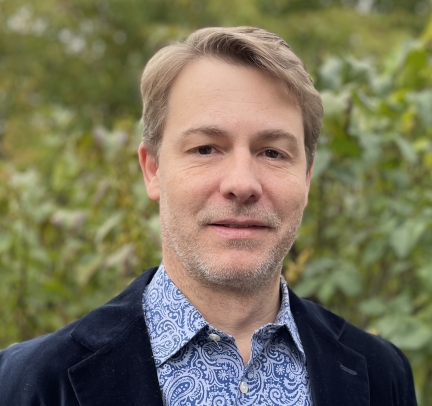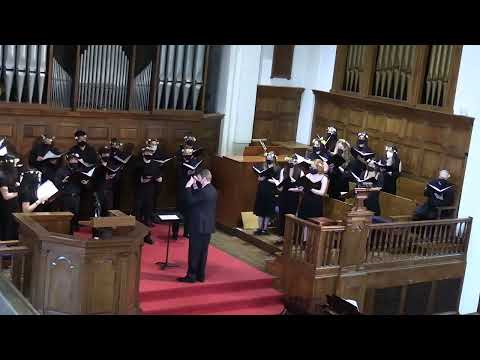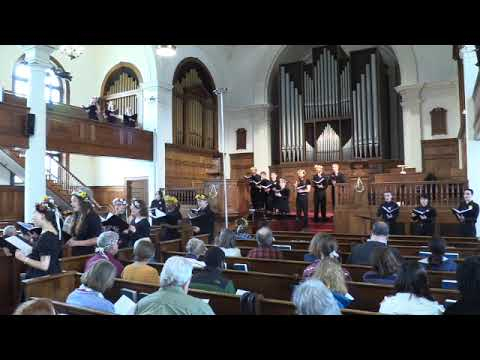Jeff Buettner
Christian A. Johnson Professor of Music and Director of Choral Activities

- Office
- Mahaney Arts Center 315
- Tel
- (802) 443-5938
- buettner@middlebury.edu
- Office Hours
- Spring: Mon. 2:30-3:30; Tues. 1:00-2:00; Thurs. 10:00-11:00
Jeffrey Buettner, DMA is Director of Choral Activities and Christian A. Johnson Professor of Music at Middlebury College, where he conducts the Middlebury College Choir and teaches conducting, musicianship, vocal ensemble performance, and the first-year seminar “Singing Communities.” Jeff’s teaching explores music engagement as pedagogy, and students in his ensembles and courses perform and engage in local community and school settings. He directs the annual Lessons and Carols for Advent and Christmas at Middlebury, programs music for college services, serves as college organist, and collaborates frequently with the departments dance and theater as well as for Middlebury Celtic Concerts and United for Ukraine cultural events. Jeff co-founded the Middlebury Bach Festival and Bach Concerts (2011-2021). Jeff serves as organist at the Congregational Church of Middlebury.
Jeff has led district and other choral festivals in Vermont, New Hampshire and New York, including the New York Summer Music Festival. He has prepared choruses for the Opera Company of Middlebury and conducted productions of Purcell’s Dido and Aeneas (2015) and Puccini’s La Boheme (2008). Jeff led choruses with the Vermont Youth Orchestra Association 2007-2015.
Jeff has traveled in Ukraine over the past twenty-five years for ensemble performance, research of Romani music, and as a Fulbright Scholar (2010) to Kharkiv State University of Arts, where he conducted the University Choir and taught American choral music styles and traditions. He has presented research and arrangements of Romani vocal music (“Gypsy Choirs”) of Ukraine nationally and internationally, including the national conference of the American Choral Directors Association (2015), and he has presented choral pedagogy at conferences in Ukraine via video conference (2022-2025).
Jeff promotes folk and traditional music as a singer and instrumentalist, and plays bodhrán, trichordo bouzouki, accordion, and guitar. Jeff’s arrangements and compositions include American folk, neo-traditional and popular styles, and music for organ.
Jeff received the DMA from Michigan State University, MM from the University of Cincinnati College-Conservatory of Music and BM from St. Olaf College.
Courses Taught
FYSE 1347
Singing Communities
Course Description
Singing Communities
Humans have used their voices in expressive communication for thousands of years, singing for work, comfort, love, praise, and many other purposes. In this course we will explore the role of singing in human communities to address questions about human need. Why do people sing together? Can singing enhance quality of life,and build community? We will sing, research singing traditions, and lead singing engagement activities in the Middlebury community. We will discuss our work with each other, and write about our experience. Interest in group vocal music is encouraged. No prior vocal experience required. 3 hrs. sem
Terms Taught
Requirements
MUSC 0160
Current
Music Theory I: Fundamentals
Course Description
Music Theory I: Fundamentals
This course is an introduction to the basic elements and theoretical concepts of Western music. We will focus on such topics as basic keyboard skills, sight singing, musical notation, rhythm, and harmony and form. Theoretical work and drills will be combined with compositional and performance projects. The goal of the course is to expand students’ musical intuition and skill and to provide the technical basis for further music study. No prior musical experience is required. (Students who wish to take upper-level composition or music theory courses must either complete this course or pass a theory and musicianship test administered by the department to demonstrate equivalent experience.) (Formerly MUSC 0109). 2.5 hrs. lect.
Terms Taught
Requirements
MUSC 0205
Current
Performance Lab
Course Description
Performance Lab
Credit can be conferred for performance in faculty-supervised ensembles: (see listing of "Ensembles" in the requirements section). One unit of credit to accrue over two semesters (spring then fall only). The appropriate supervising faculty will give grades, based on attendance and quality of performance. A student should inform the ensemble director of intent to sign up for this course before starting, and should actually register for MUSC 0205 only the SECOND of the two terms by adding it as a fifth course. (Approval required)
Terms Taught
Requirements
MUSC 0243
Conducting
Course Description
Conducting
In this course students will develop basic skills of conducting including movement, aural skills, creative gesture, and score study. Daily work will include preparation to conduct an ensemble of classmates. Score reading ability and proficiency on an instrument or in singing is required. (MUSC 0160 or by approval of instructor. Score-reading ability is required.)
Terms Taught
Requirements
MUSC 0400
Approaches to Music Inquiry
Course Description
Approaches to Music Inquiry
Topic is determined by the instructor - refer to section for the course description.
Terms Taught
Requirements
MUSC 0500
Current
Upcoming
Independent Study
Course Description
Independent Study
Admission by approval. Please consult published departmental guidelines and paragraph below.
Terms Taught
MUSC 0704
Current
Upcoming
Senior Work
Course Description
Senior Work
Senior work is not required of all music majors and joint majors. However, students interested in and eligible for departmental honors (see guideline above, in "Departmental Honors" section) may propose one or two-semester Senior Work projects. Projects may be in history, composition, theory, ethnomusicology, performance, or electronic music, and should culminate in a written presentation, a public performance, or a combination of the two. MUSC0704 does not count as a course toward fulfillment of the music major.
Project and budget proposals for Independent Study and Senior Work should be submitted by the previous April 1 for fall and winter term projects, and the previous October 15 for spring term projects. Budget proposals will not be considered after those dates. Project proposals will be considered after the deadline but are more likely not to be approved due to previous commitments of faculty advisors or other scheduling reasons.
Terms Taught
MUSC 1056
Sing the World into Place
Course Description
Sing the World into Place
Would you enjoy spending your winter term...singing? Are you excited to learn and compare different ways of singing? Do you perceive singing as a way to develop community? In this course, we will address these questions as we explore singing of different places, purposes, and time periods. Through daily workshops supported by readings, listening, and discussion, we will build a broader understanding of how and why we sing. Our repertoire will span genres, including global folk, traditional, classical and popular music broadly defined. We will reinforce positive attributes of group singing and refine our narrative of the collective singing experience. No prerequisite or vocal performance experience required. go/singtheworldintoplace Lecture/disc.
Terms Taught
Requirements
Areas of Interest
Choral, Baroque Romani, Celtic, and Organ music; Instrument building


